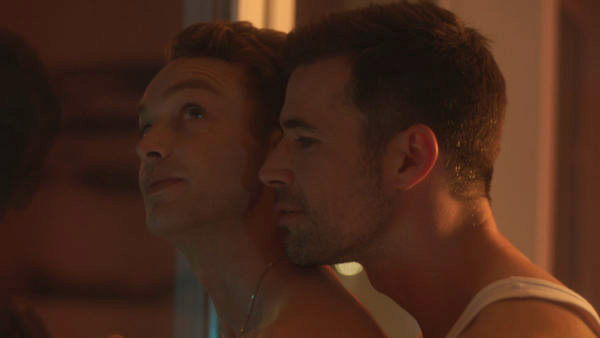Sodom (2017) – A Haunting Tale of Forbidden Longing and Self-Discovery
Sodom (2017), directed by Mark Wilshin, is a poignant and introspective British-German indie film that explores themes of identity, intimacy, and liberation in the backdrop of a single transformative night. The film centers on Will, a young British man on the eve of his wedding, who finds himself unexpectedly entangled with Michael, a confident German man who challenges Will’s perceptions of himself, his desires, and his future.
Set in the city of Barcelona, the entire narrative unfolds over the course of one evening, creating a powerful sense of immediacy and tension. What begins as a chance meeting between two strangers quickly evolves into a deeply emotional and psychological exploration. Michael, open and self-assured in his sexuality, contrasts starkly with Will, who is closeted and deeply conflicted about his impending marriage to a woman. Their interaction is raw, layered with suppressed emotions and electric chemistry, as they confront truths that have long remained buried.

The film’s minimalistic approach in terms of setting and character count enhances the intimacy of the story. The camera lingers on subtle gestures, expressions, and silences, giving weight to moments that speak louder than dialogue. This technique draws viewers into the emotional turbulence experienced by the protagonists. The performances of Jo Weil (as Will) and Pip Brignall (as Michael) are deeply compelling, capturing the vulnerability, confusion, and longing that define their characters.
Rather than offering a conventional romance, Sodom functions as a quiet rebellion against societal expectations and internalized repression. It is not merely about two men spending a night together—it is about a man being forced to confront who he really is. Will’s struggle represents that of many who find themselves trapped in lives they never truly chose, shaped by fear, tradition, or pressure. Michael, in contrast, embodies liberation and truth, challenging Will to face himself without pretense.
The film’s title, Sodom, is a deliberate provocation, referencing the biblical city often associated with sin and judgment. Yet here, the name is reimagined—not as a place of destruction, but as a space of revelation and awakening. The film subtly critiques the way society demonizes queer desire, while offering an alternative narrative: one where self-acceptance is not shameful, but empowering.

Despite its short runtime and simple premise, Sodom leaves a lasting impact. It does not aim to deliver easy resolutions or traditional happy endings. Instead, it captures a fleeting yet profound encounter that alters the trajectory of a man’s life. It invites viewers to reflect on their own truths, choices, and the price of authenticity.
In conclusion, Sodom is a thoughtful, emotionally charged film that uses the intimacy of a single night to explore universal themes of identity and freedom. Through its subtle storytelling and strong performances, it makes a powerful statement about the courage it takes to live one’s truth—especially in a world that often punishes those who do.



-1751708921-q80.webp)